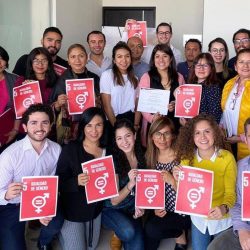Women energy practitioners talk about the future of energy and their contribution
Greater gender inclusion in the energy sector will help the world reach the clean and sustainable energy future we need, practitioners say.
The evidence is clear. Considering women and girl’s needs and involving a greater number of women in the energy sector results in better outcomes for people and the planet.
Research shows that companies with more women in leadership roles are more likely to invest in renewable energy and to reduce carbon emissions throughout their value chain. Yet, women are severely under-represented on the executive boards of energy companies.
Globally, the sustainable energy workforce remains predominantly male. With only 32 percent of its workforce female, it has a long way to go compared with health and social work (70 percent). And the challenge increases with seniority.
On the policy front, an assessment conducted by the International Union for Conservation of Nature (IUCN) found that energy frameworks the world over are largely gender blind. In other words, they don’t consider the specific needs of women and men, or reflect their different capacities to access and participate in energy services.
With a few exceptions, newer strategies designed to guide energy transitions are not gender specific either, which “risks deepening the male/female divide in sustainable energy” lamented Irene-Giner Reichl, President of the Global Women’s Network for the Energy Transition, in a recent statement.
Against this backdrop, and the growing concerns that the economic crisis resulting from COVID-19 could rollback gains, we talked to women working in the energy efficiency sector about the connections between gender inclusion and the future of energy.
A clear theme emerged: regardless of the many challenges, women are out there getting things done to accelerate the energy transition, which entails a lot more than switching fuels. But, as the 2030 deadline for the SDG Agenda looms, bolder actions are needed to ensure way more women can both benefit from and contribute to this deep societal transformation.
Here’s what four accomplished women from Egypt, Mexico, Myanmar, and South Africa had to say.
“Implement policies properly” – Faith Mkhacwa, South Africa

Faith Mkhacwa conducting a boiler assessment at the Rhodes Food Group in the Western Cape as part of the steam systems expert-level training.
Faith Mkhacwa is a senior project manager for UNIDO’s Industrial Energy Efficiency (IEE) project at the National Cleaner Production Centre South Africa. She helps companies of all sizes and from diverse sectors across the country save energy and reduce CO2 emissions. She also chairs the Southern African Females in Energy Efficiency (SAFEE) organization, which is dedicated to mentoring women and helping them navigate their way into the sector.
Even though the pool of female talent in South Africa’s energy sector is growing in numbers and commitment, women are still a minority – especially in leadership positions – which, in Faith’s view, is problematic. After all, South Africa is the 14th largest emitter of greenhouse gas emissions and urgently needs to transition to a clean and sustainable economy.
“There are so many women who are just as qualified, passionate and talented and who want to contribute to solving South Africa’s many energy challenges,” says Faith. And, “we know from experience that when women are given the roles of energy managers, energy champions and energy engineers, they drive efficiency for companies in amazing ways,” she adds.
Faith praises the many gender policies the country has put in place, but worries follow-up strategies to monitor implementation and help companies move in the right direction are not robust enough and contributes to the slow progress. She believes that “only if policies are implemented properly, will things really start moving and taking shape.”
But Faith is hopeful. She foresees a very different future thanks to the many women like her who “just want to get things done”. The COVID-19 crisis, which is re-challenging gender equality in the workplace in so many ways, has again proved this to her.
During the lockdown period, she stayed in touch with her SAFEE network of women energy managers. Knowing that their jobs were on the line, Faith found they were all using the ‘down’ time to develop strategies and get ready “like never before” to go back to work and help their companies build back better.
“I am hopeful that instead of women losing their jobs due to the impact of the pandemic, female energy managers will finally be given a voice and an opportunity”.
“Promote gender inclusion and make it part of a deep cultural shift” – Erika Salinas-Talavera, Mexico

Erika Salinas from the Carbon Trust in Mexico with her peers after conducting an awareness session about the importance of gender equality in the energy field for the Energy State Agency in Puebla.
Erika Salinas-Talavera is a manager at the Carbon Trust office in Mexico and was a board member of the Women’s Network in Renewable Energy and Energy Efficiency (REDMEERE by its acronym in Spanish) from 2016 to 2020. Such networks are critical in countries like Mexico where the energy sector – responsible for the vast majority of the GHG emissions – is dominated by men.
“They are particularly helpful for women in junior and mid-level positions. Not only does it allow them to interact with and be mentored by other women who’ve made it to senior positions, they can also access important information,” explains Erika.
Her time investment in REDMEERE was partly due to a reality Erika is grappling with: there is an immense pool of young female talent that is becoming available but isn’t being tapped to its full potential.
Through her own recent research, she found that 70 percent of university students that were studying degrees related to sustainable energy were women. But then, when she looked at the data available from the labor market, she was shocked to find that only 30 percent of women get their Diploma and are involved in the sustainable energy sector across the country.
“So what is happening with that wealth of talent that is disappearing? Why are we losing them along the way?” she asks.
The reasons lie in the very first years of a young woman’s career in the energy sector. “What happens at the very beginning may well determine a path. If women are not involved in the operations side of the trade from the outset, if they don’t access further training, role models and mentors they quickly become discouraged,” she says.
And that’s why promoting gender inclusion needs to happen actively. “It needs to be part of a deep cultural shift and it needs to happen in government structures, in big and also in small companies.”
Whilst very successful, her own career path in the energy sector wasn’t always smooth. She’s had to overcome gender discrimination on many occasions. Mostly small things like, for example, a male peer not acknowledging her in high level meetings, which, as she says, “it was always mostly unintentional and triggered by the fact that they are not used to seeing senior professional women at the table.”
In addition to promoting gender inclusion, Erika insists that mainstreaming gender in programmes led by government and non government institutions should be happening even if it’s not mandatory. Way more visibility should also be given to the stories of women from remote areas who´ve often traveled unconventional journeys to get into the sector. And finally, “cultural shifts also need to happen in our societies and in our homes to end the small every-day incidents of gender discrimination,” she says.
Erika agrees that progress is slow, but she is hopeful because as we speak, she says, “women all over the world are getting there and leading by example. They are bringing creativity, competitiveness and new ways of work that create better solutions.”
“Use women’s and men’s skills equally” – June Khaing Wint Tun, Myanmar

June Khaing Wint Tun from UNIDO in Myanmar believes that the education system should promote the role of women in energy in her country and beyond.
June Khaing Wint Tun has been working for UNIDO in the field of energy and environment for the past three years. Freshly graduated in Environmental Engineering and Management from the Asian Institute of Technology in Thailand, she joined the team as a communications assistant.
Amongst other things, June’s work involves coordinating activities with the industries they help to adopt energy efficiency measures. Particularly in the technical areas, she says, the vast majority of her counterparts in the companies are men. As she engages with government officials on policy work, she is in touch with some women but it is the men who make the decisions.
“Because of the nature of my role, being a young woman isn’t a problem. But things are different when it comes to more technical expert roles. That’s when being a female in a vastly male environment can be harder,” explains June.
Data about women’s involvement in industry is largely unavailable for Myanmar but a recent survey conducted in the country by the International Finance Corporation in 10 energy companies found that only 28 percent of employees were women.
In June’s view, women play a critical role in the energy and climate change fields.
“In vast parts of the country, the population can’t access electricity. And it is largely women who manage the households’ energy resources and who suffer the consequences of energy deprivation. So women have a better understanding and deeper vested interests in managing energy efficiently and achieving electrification targets,” she explains.
Boosting the involvement of women in the energy field needs to start with education. While there are many engineer schools in the country, they are mostly filled with men who are encouraged to seek a career in those technical fields. Energy is also a relatively novel topic and there aren’t many learning opportunities for women.
“Young women have to be introduced to the issues of renewable energy and energy efficiency at university or even earlier so they become interested and encouraged to join this thriving sector,” she says.
Social norms are also instrumental for keeping women out of the sector, according to June. “Working in energy involves a lot of travel to remote places, which can deter women because our social norms don’t welcome them traveling around the country.” On top of that, she says, it is a traditional belief that men are better suited for leadership roles and for making decisions.
“But I know that if more women were involved in the energy sector we would be able to showcase our abilities, management and creative skills. And if women’s and men’s skills were used equally we would meet the targets we’ve committed to in order to curb climate change.”
“Let your work speak for you” – Rabab Manee, Egypt

Rabab Manee from Egypt has experienced many times how women excel implementing energy efficiency solutions across production processes.
Rabab Manee leads the energy and environmental sustainability efforts of Egypt’s Oriental Weavers. Before that she worked for UNIDO helping companies implement energy management systems and system optimization.
Throughout her career, even in her new role, Rabab often felt she had to ‘struggle’ to be appreciated for her skills due to her gender. Colleagues often questioned her expertise and ability.
But, determined to prove herself, she introduced strategic changes to the production chain during her first three months in the job and managed to reduce the company’s energy consumption by 7 per cent. “Once I could show results, I got the support and trust of others and life at work became ‘normal’,” she recalls.
Rabab’s experience is common. With barely 15 percent of women represented in the energy sector in Egypt – and mostly in administrative roles – she says convincing business owners and clients that women can deliver the same results is very hard and often comes down to having “the right attitude”. “I have to be stronger and more convincing. I have to be present all the time and prove myself,” she asserts.
Years of experience on manufacturing floors showed her that women excel when it comes to implementing energy efficiency across complex production processes. “I trust women’s organized minds and their ability to pay detailed attention to everything that is involved, including the financial implications when implementing energy efficiency measures.”
That’s why she insists that women need to be confident and study hard in order to be prepared to face the challenges. But her motto and most valued advice to her peers is: “let your work speak about you and leave your footprint everywhere.”
Now, with the country hit by the COVID-induced downturn, Rabab is able to trace the many changes she has introduced over the past months and the energy savings she has secured. She is convinced that her persistence has helped the company become more resilient and able to overcome this economic shock.
